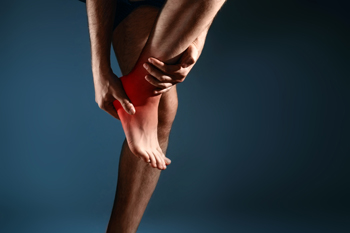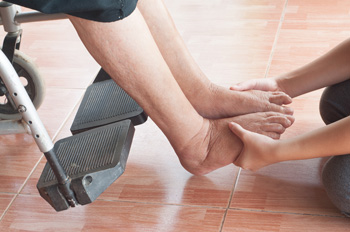 Cellulitis is a bacterial infection of the deeper layers of the skin. It can affect any part of the body, but is most frequently seen in the feet. Cellulitis can be contracted by bacteria entering a wound, cut, scrape, or other small openings in the skin. Symptoms of this condition include red, swollen, warm, tender, and painful skin, changes in the texture of the skin (pitting) and blisters. A fever and chills can also accompany this infection. Cellulitis is treated with antibiotics and resting and elevating the affected foot to reduce swelling. Left untreated, cellulitis can cause grave complications. If you notice signs of infection in your feet, please seek the care of a podiatrist as soon as possible.
Cellulitis is a bacterial infection of the deeper layers of the skin. It can affect any part of the body, but is most frequently seen in the feet. Cellulitis can be contracted by bacteria entering a wound, cut, scrape, or other small openings in the skin. Symptoms of this condition include red, swollen, warm, tender, and painful skin, changes in the texture of the skin (pitting) and blisters. A fever and chills can also accompany this infection. Cellulitis is treated with antibiotics and resting and elevating the affected foot to reduce swelling. Left untreated, cellulitis can cause grave complications. If you notice signs of infection in your feet, please seek the care of a podiatrist as soon as possible.
Foot Pain
Foot pain can be extremely painful and debilitating. If you have a foot pain, consult with Dr. Richard DiMario from Maine. Our doctor will assess your condition and provide you with quality foot and ankle treatment.
Causes
Foot pain is a very broad condition that could be caused by one or more ailments. The most common include:
Diagnosis
To figure out the cause of foot pain, podiatrists utilize several different methods. This can range from simple visual inspections and sensation tests to X-rays and MRI scans. Prior medical history, family medical history, and any recent physical traumatic events will all be taken into consideration for a proper diagnosis.
Treatment
Treatment depends upon the cause of the foot pain. Whether it is resting, staying off the foot, or having surgery; podiatrists have a number of treatment options available for foot pain.
If you have any questions, please feel free to contact our office located in York, ME . We offer the newest diagnostic and treatment technologies for all your foot care needs.
 Over time, the feet begin to develop more problems due to everyday wear and tear. There is more stress placed on the joints in the feet, and the skin gets thinner and loses its elasticity. Because of the variety of debilitating foot issues that can occur with aging, it is important that elderly patients take care of their feet. Common issues that indicate aging feet include aches and pains, bunions, circulatory issues, and a curling up of the toes. Exercise, proper toenail trimming, moisturizing the feet, and wearing shoes that are supportive and that fit correctly are a few ways to minimize the effects of aging on the feet. Doing yearly checks with a podiatrist is another effective way to help care for the feet. A podiatrist can help detect a variety of issues that include diabetes and poor circulation, and they can help treat everyday foot problems like bunions and ingrown toenails.
Over time, the feet begin to develop more problems due to everyday wear and tear. There is more stress placed on the joints in the feet, and the skin gets thinner and loses its elasticity. Because of the variety of debilitating foot issues that can occur with aging, it is important that elderly patients take care of their feet. Common issues that indicate aging feet include aches and pains, bunions, circulatory issues, and a curling up of the toes. Exercise, proper toenail trimming, moisturizing the feet, and wearing shoes that are supportive and that fit correctly are a few ways to minimize the effects of aging on the feet. Doing yearly checks with a podiatrist is another effective way to help care for the feet. A podiatrist can help detect a variety of issues that include diabetes and poor circulation, and they can help treat everyday foot problems like bunions and ingrown toenails.
Proper foot care is something many older adults forget to consider. If you have any concerns about your feet and ankles, contact Dr. Richard DiMario from Maine. Our doctor can provide the care you need to keep you pain-free and on your feet.
The Elderly and Their Feet
As we age we start to notice many changes in our body, but the elder population may not notice them right away. Medical conditions may prevent the elderly to take notice of their foot health right away. Poor vision is a lead contributor to not taking action for the elderly.
Common Conditions
Susceptible Infections
Diabetes and poor circulation can cause general loss of sensitivity over the years, turning a simple cut into a serious issue.
If you have any questions please feel free to contact our office located in York, ME . We offer the newest diagnostic and treatment technologies for all your foot and ankle needs.
In our increasingly fast-paced world, many people feel that they don’t have any extra time to devote to their foot health. However, looking after your feet doesn’t have to be a time-consuming hassle. A few quick and easy things that you can do include keeping your feet clean and dry, moisturizing your heels to prevent cracks, and checking your feet regularly for anything unusual, such as injuries, discoloration, swelling, or pain. If you have otherwise healthy feet, then you could spend as little as 10 minutes per week giving them a little extra care to keep them healthy. People with pre-existing conditions, such as diabetes, may require more foot care. To learn more about caring for your feet, please consult with a podiatrist.
Everyday foot care is very important to prevent infection and other foot ailments. If you need your feet checked, contact Dr. Richard DiMario from Maine. Our doctor can provide the care you need to keep you pain-free and on your feet.
Everyday Foot Care
Often, people take care of their bodies, face and hair more so than they do for their feet. But the feet are a very important aspect of our bodies, and one that we should pay more attention to. Without our feet, we would not be able to perform most daily tasks.
It is best to check your feet regularly to make sure there are no new bruises or cuts that you may not have noticed before. For dry feet, moisturizer can easily be a remedy and can be applied as often as necessary to the affected areas. Wearing shoes that fit well can also help you maintain good foot health, as well as making it easier to walk and do daily activities without the stress or pain of ill-fitting shoes, high heels, or even flip flops. Wearing clean socks with closed shoes is important to ensure that sweat and bacteria do not accumulate within the shoe. Clean socks help to prevent Athlete’s foot, fungi problems, bad odors, and can absorb sweat.
If you have any questions please feel free to contact our office located in York, ME . We offer the newest diagnostic and treatment technologies for all your foot and ankle needs.
If you or someone you love is having difficulty walking up stairs, struggles with balance, or is prone to tripping or falling, they may have a condition known as foot drop. This condition makes it difficult for a person to lift the front part of the foot, and may also cause numbness, weakness, and limpness in the foot. Foot drop may also trigger a change in how a person walks, in order to counteract these impediments. Foot drop most typically occurs when the peroneal nerve (which controls the muscles that lift the foot) becomes damaged due to compression, injury, or disease. It may also be due to a muscular or anatomical issue. This condition may be temporary or permanent, with possible treatments including orthosis, orthotics, physical therapy, nerve stimulation, or even surgery if necessary. Because the symptoms of foot drop can raise a person’s risk of falling and/or tripping, a podiatrist should be consulted as soon as possible to explore all treatment options.
Preventing falls among the elderly is very important. If you are older and have fallen or fear that you are prone to falling, consult with Dr. Richard DiMario from Maine. Our doctor will assess your condition and provide you with quality advice and care.
Every 11 seconds, an elderly American is being treated in an emergency room for a fall related injury. Falls are the leading cause of head and hip injuries for those 65 and older. Due to decreases in strength, balance, senses, and lack of awareness, elderly persons are very susceptible to falling. Thankfully, there are a number of things older persons can do to prevent falls.
How to Prevent Falls
Some effective methods that older persons can do to prevent falls include:
Falling can be a traumatic and embarrassing experience for elderly persons; this can make them less willing to leave the house, and less willing to talk to someone about their fears of falling. Doing such things, however, will increase the likelihood of tripping or losing one’s balance. Knowing the causes of falling and how to prevent them is the best way to mitigate the risk of serious injury.
If you have any questions, please feel free to contact our office located in York, ME . We offer the newest diagnostic and treatment technologies for all your foot care needs.